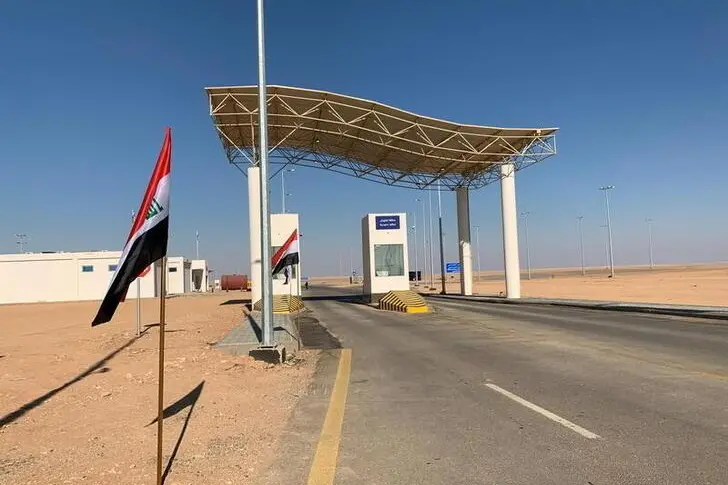PHOTO
The opening of the Jadidah-Arar border crossing between Saudi Arabia and Iraq after its closure for almost three decades is a historic step that will broaden opportunities for economic development, trade and investment.
There is no doubt that the move is the result of painstaking efforts that Riyadh has been making for years since the formation of coordination councils between the two countries. Both neighbors have worked tirelessly to achieve this and have sought to return relations to their previous status. In addition there was also a desire to extend a helping hand to our Iraqi brothers in light of the coronavirus pandemic and the economic downturn resulting from the outbreak.
The opening of this qualitative project comes at a time when Saudi Arabia is seeking to increase investments in Iraq to SR10 billion ($2.7 billion). The coordination work committees recognize the importance of accelerating the formation of the joint business council and facilitating the work of Saudi companies and the private sector. Iraq has highlighted an investment portfolio of 6,000 projects worth $100 billion. This includes a port on Saudi territory, 75 km from the Saudi city of Arar, in a trade exchange area that includes government installations and residential buildings.
The construction and improvement project for the Jadidah-Arar port on the Saudi side and the Arar port on Iraqi soil is located in a total area of 1.6 million square meters. It includes a logistical area that will serve as an economic gateway for the northern part of Saudi Arabia and also strengthen economic relations between the two countries. There will also be new areas of cooperation in the economic and development fields, which will also contribute to facilitating the intra-regional trade movement.
There will be many opportunities and investments of great benefit to both countries. During the past week, dozens of memoranda of understanding and agreements in various fields were signed between Iraq and the Kingdom. This occurred as the two parties’ intentions to open the Arar port were announced and were seen as the beginning of a new phase in relations between the two countries.
Cooperation in the economic field and also in security and intelligence will be accompanied by cooperation in other fields for the benefit of both countries. Both have been targeted by terrorism which, especially in Iraq, has harmed security and stability. Iraq suffers from the presence of many terrorist organizations and Iranian militias which seek to influence Baghdad to follow Tehran.
Today, those militias are opposed to any rapprochement and Saudi investment because they know that the Saudi presence will make Iraq, along with its people and government, comfortable and willing to work with the Kingdom. Riyadh’s policy is always to extend a helping hand and participate in growth and prosperity, and this is what distinguishes it from Tehran, whose policy is to support terrorism and the formation of sectarian terrorist militias that divide countries, and produce ruin and devastation.
This is what the people of Iraq may experience since the position of Saudi Arabia is well known in Yemen, Lebanon and Syria. The world has seen how Tehran entered those countries in order to destroy them with its militias, both terrorist and sectarian.
Iraq is more firmly bound to the Kingdom than it is to Iran. The social and cultural ties between Riyadh and Baghdad are great. With that in mind, these two countries can work for the future security and stability of both while, at the same time, guaranteeing long-lasting and fruitful relations.
The unification of efforts and experiences in both countries will benefit not only Baghdad and Riyadh, but also the region’s economy, security and stability. It will block those who want to stop this joint work and also encourage other Arab countries to join in cooperation that will accelerate the return of Iraq to its place in the Arab world.
Cooperation will increase job opportunities for the Iraqi people who today are in dire need of these opportunities for future generations. In addition, most of the region depends on oil for its income; the price of oil fluctuates and it is not what it was in the past. It is income from a single source. The diversification of economies and investments have become today’s great needs. Work on this requires concerted effort and must be implemented in various ways, including trade exchanges and economic investments that will bear fruit.
None of this, however, can be achieved by agreements alone, but rather by working to rid the region of foreign interference in the policies of countries along with the weapons carried by terrorist militias operating outside the framework of the state. Since these two factors are the biggest obstacles to economic growth and the success of economic investments, the entire region must work to confront and deter both, not only for the sake of security and stability but also for the sake of peace and prosperity.
Riyadh and Baghdad are looking to a future that will benefit both countries. Each has worked to make this happen in spite of those who oppose progress that is in everybody’s interest. The opening of the Jadidah-Arar border crossing is only the beginning.
- Dr. Hamdan Al-Shehri is a political analyst and international relations scholar. Twitter: @drhamsher7
Copyright: Arab News © 2020 All rights reserved. Provided by SyndiGate Media Inc. (Syndigate.info).





















